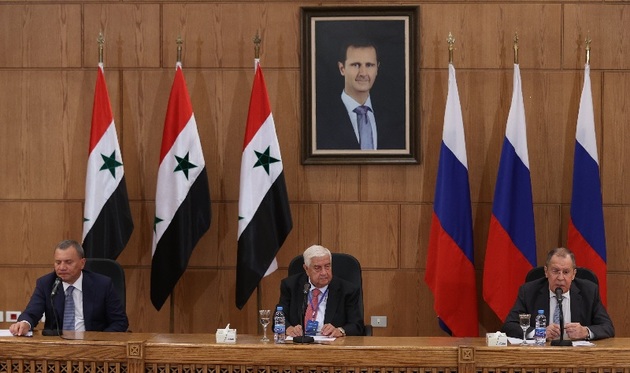Doha hosted the first consultative meeting of the Russian, Turkish and Qatari foreign ministers on Syria. The ministers said that they will continue to hold regular meetings. Why does each of the three players need such meetings, and how can they push for political resolution in Syria?
On March 11, in Doha, Russian Foreign Minister Sergei Lavrov, together with his Turkish and Qatari colleagues, Mevlut Cavusoglu and Sheikh Mohammed bin Abdulrahman Al-Thani, launched a new trilateral format to promote a political solution to Syria’s conflict. Despite the fact that the three countries have polar positions on Syria - Russia supports Bashar al-Assad's government, Turkey and Qatar back the opposition - they still have common interests. First, they are interested in the territorial integrity of Syria. The joint statement "reiterates determination to fight terrorism in all its forms and manifestations and to oppose the implementation of the separatist plans that undermine Syria’s territorial integrity and threaten the national security of neighbouring countries," Lavrov said.
For Russia, Syria's integrity is important in order to guarantee Damascus's rule over the country's uncontrolled territories. Ankara needs it in order to prevent the independence of the Kurdish separatists from the YPG. For Turkey, the fight against terrorism is, first of all, a confrontation with the US-backed YPG which controls large territories across the Euphrates River, for Russia - the destruction of Hayat Tahrir Ash-Sham (a terrorist organization banned in Russia) that settled in Idlib. But ISIS (a terrorist organization banned in Russia) is seen as an absolute evil by each of the parties.
Lavrov, Cavusoglu and Al-Thani agreed on the voluntary return of refugees and internally displaced persons, which is important for Moscow, as well as the work of the Constitutional Committee. The latter, by the way, was launched in 2018 thanks to Russia-Turkey efforts after the Syrian National Dialogue Congress in Sochi. The topic of sanctions remains undecided. Lavrov said that restrictive measures are bad for the economy and the humanitarian situation in Syria. However, Doha and Ankara - advocating Assad's removal - insist that pressure on Damascus should continue. Cavusoglu and Al-Thani did not mention the sanctions in front оf Lavrov.
Motives of the parties
Middle East and North Africa program coordinator at the Russian International Affairs Council (RIAC) Ruslan Mamedov believes that the trilateral format will allow Russia to influence certain groups of the Syrian opposition.
"For Russia, such meetings are necessary, since Qatar is absent in the Astana format. Qatar has the opportunity to influence certain groups of the Syrian opposition, being their sponsor. In this regard, agreements with Turkey and Qatar will also allow to overcome the counteraction from part of the Syrian opposition to reconcile with the government in Damascus," he told Vestnik Kavkaza.
Senior fellow at the Washington-based Middle East Institute Charles Lister told Al Monitor that for Russia this trilateral group "could feasibly offer a more realistic platform with which to bring a potential resolution to Syria to the Americans without the complicating factor of initial Iranian involvement."
Turkey and Qatar want a new format to "incorporate opposition groups into the future state system and agree on the modalities of the new political system in Syria," Ruslan Mamedov said. The American expert proceeds from the fact that for Qatar, this presents another opportunity to act as "mediator and facilitator for resolving a major conflict", as well as push back against the UAE. "For the Turks, engaging in a trilateral process alongside Qatar offers an opportunity to heighten leverage against their peer rival Russia, with whom Ankara maintains a delicate relationship based on balance and deterrence," Charles Lister added.
Feasibility of the format
The three ministers agreed to hold regular meetings. There are already two formats on the Syrian issue - those in Geneva and Astana. The first is supported by Western countries, the second - by the Russian Federation, Turkey and Iran. Their goal is to bring the positions of the Assad government and the opposition closer. Doesn't another format overload the Syrian settlement? According to Lavrov, the "Doha format" in no way replaces the Astana format (Russia, Turkey and Iran), but complements it.
The RIAC expert doubts that trilateral negotiations can advance a solution to the conflict in Syria, but admits their contribution to the settlement.
"I do not think that the trilateral format will advance the resolution of the conflict in Syria, but it can make a substantive contribution. This is a chessboard around Syria. There are several boards at different levels with different players. The Qatari format is just one of the boards, but, of course, an important one. These tripartite consultations support the process launched in Astana. In particular, in terms of technical agreements on the ground. To some extent, they will help a political settlement, but will not replace the Astana and Geneva processes."
According to the orientalist, Russia will try to simultaneously solve two complex tasks: the return of Syria to the Arab League and the achievement of a political settlement. The first task is partly being implemented. The UAE supported the reinstatement of Damascus in the Arab League: "I think this trilateral format between Russia, Turkey and Qatar is aimed at trying to force Qatar to be softer towards Damascus and agree on modalities for Syria's return to the Arab League in the medium term."
As for the integration of the opposition into the government, a lot will depend on Assad's position. "The main question is whether Damascus will agree to any compromises, to some kind of political settlement. Of course, all the keys to resolving this issue are in Damascus. But it seems to me that it is not interested in any rapprochement with the Syrian opposition groups, simply because of upcoming elections. Only after the elections Damascus will be calm about how and with whom to communicate, how and whom to return to the "fold of the motherland" - this is what they like to say," Ruslan Mamedov emphasized.






